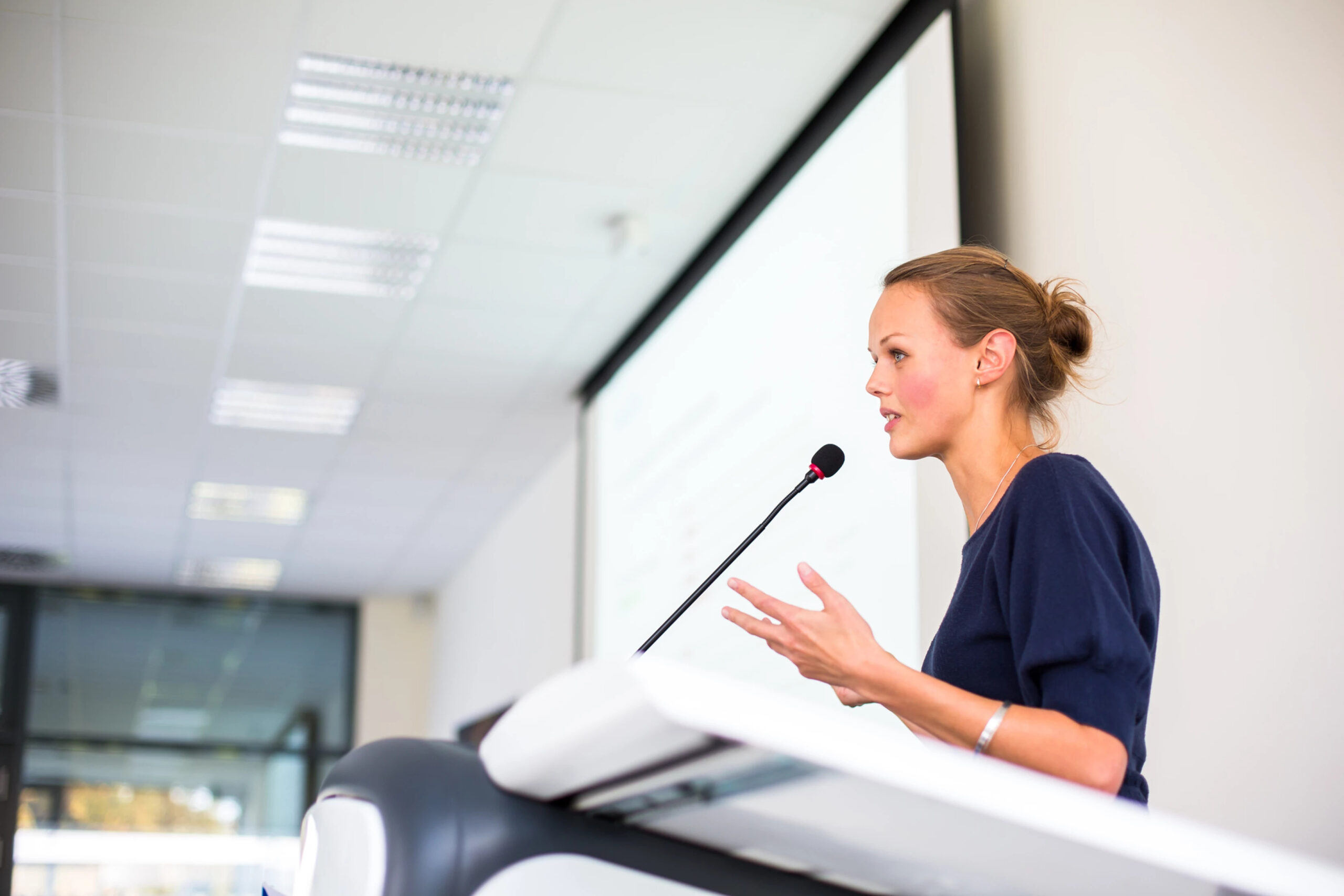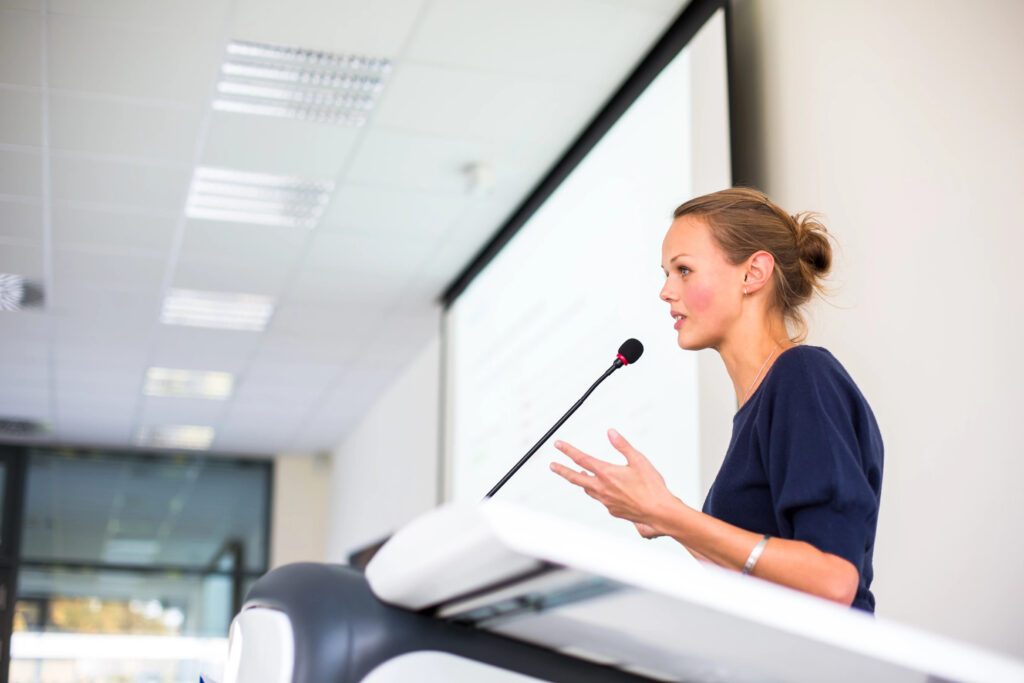
What Is Public Relations?
The official definition of public relations (PR) as given by the Public Relations Society of America is “a strategic communication process that builds mutually beneficial relationships between organizations and their publics.”
So, what does that really mean?
In a very simple sense, public relations is how you relate to the public. If done well, it helps manage and enhance your company’s reputation and brand. Public relations builds relationships and lets you create ongoing conversations with your target audiences and those that influence those audiences.
What PR encompasses

Speaking engagements are a great way to build credibility and awareness of your practice within your community.
PR takes many different formats, from news releases, to speaking engagements to social media. In larger companies, it can include crisis communication, internal communication and more. As a smaller practice, your PR may include some or all of the following:
- Press releases and conferences
- Special office events
- Community meetings to provide background and educate
- Speaking engagements
- Brochures, newsletters, etc.
- Web site content
- Social media, including blogging and Facebook posts
Why Public Relations Is Important to Your Practice
Public relations is one of the most cost-effective ways you as a small business can raise attention and boost awareness about your company. If you do it effectively and with the right slant, PR can reach many people and have a large impact on your business.
PR helps:
- Raise awareness of your company and your brand
- Tells your customers what makes you unique
- Builds credibility
- Portrays you as successful, honest and worth doing business with
- Educates your customers
- Drives your customers to take action
How It Helps Your Practice Become a Pillar of the Community

Offer one-day-only, onsite free hearing consultations at local assisted living facilities.
As an independent practice, you have an advantage over the big-box retailers to become known in your marketplace as a pillar of community. This means three distinct groups of individuals (the community, primary care physicians and patients) look to you for insight, support and wisdom for all matters related to hearing and communication.
Public relations can help you become a pillar of community by raising awareness, facilitating conversations and forming deep, long-lasting relationships with the three vital groups.
Tips for Effective PR
As you set out on your public relations journey to enhance and build your brand and reputation, there are a few key ideas to keep in mind.
Know your message
One of the most important things for effective PR is to have a solid brand as your foundation. When you know what you stand for, and you’ve defined your key messages, it’s time to build upon them. Whether it’s online, in print or in person, your story should be consistent and rooted in your founding principles.
Because with PR you often don’t have complete control over what’s being said or written about you, it’s important to make it clear from the beginning what defines you as a practice and differentiates you from your competitors. Get the word out to many and get it out often.
Remember, it’s free media, not paid
Unlike advertising, public relations is for the most part free. And though it may reach a lot more people, you don’t have as much control over the message. For example, a reporter isn’t going to write exactly what you want them to, and the buzz from an office event can’t be scripted. This should give you all the more reason to build solid relationships with those that can make a difference in how your practice and brand is communicated.
Pitch the right story
Whether you’re calling on a local reporter to write a feature article or you’re speaking at an event, make sure the story you’re telling is the right one. Find the right slant by asking the following questions:
- Is this relative?
- Does it follow current trends?
- Am I focusing on the right timelines for events and messaging?
- Why does this matter to my audience?
- What’s in it for my audience?
- What is the local angle, how can the story be personalized?
Keep in mind that although your brand and messaging foundation should be consistent, there is always room to tailor your message to a particular audience. Bringing in local information and making sure the message is timely will also make it more personal and will cause a greater impact.
Take matters into your own hands
Traditionally, much of public relations has been in the hands of PR agencies and the media. But with today’s recent burst in social media, companies, including yourself, can now hold the reins. Creating blog posts, Facebook messages, tweets and more lets you connect directly with your target audience instead of relying on others. Take advantage of the opportunities!
What’s Next?
There are many things you can do to start on building your public relations campaign. We’ll look at a few.
Create a media list
- Find the local reporters in radio, print and television who cover your industry.
- Contact the key players and begin to form relationships – introduce yourself, meet for coffee, send them intro information, etc.
Prepare a press release
- Develop a story of importance. Perhaps it’s around Better Hearing Month in May. Make it local and focus on timing, significance and interest to your target audience.
- Pitch it to your media list via email and a phone call.
Put on a special event
- Focus on relevance to your audience.
- Events don’t need to be huge or extravagant to make a lasting impression. An educational seminar, a lunch & listen or simply an informational walk-in day will do the trick.
Seek out local community clubs
- Network with the members.
- Offer to be a guest speaker at a regular meeting.
Visit local assisted living places
- Offer one-day-only, onsite free hearing consultations.
- Drop off literature that would be useful.
Send a regular newsletter to your customers
- Provide useful information focused on educating, not selling.
Get social
- Set up a blog and begin making regular entries.
- Send out regular Facebook posts and tweets.
Check out online media sites
- Find ways to connect with online media sites like PR Newswire and online trade journals. Each can lead back to your Web site which builds credibility and awareness.
- Check out the PR Newswire PR Toolkit. It’s a great resource of information for small businesses.
However you want to start, just do it. Choose a few, form your plan and get going.
- The Role of Reviews in Your Businesss Success - March 17, 2022
- Build Your Brand with PPC - October 3, 2019
- Narrow Your Market: Less Is More - August 12, 2019
